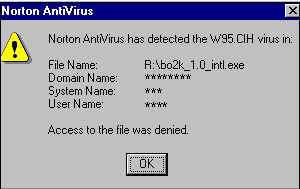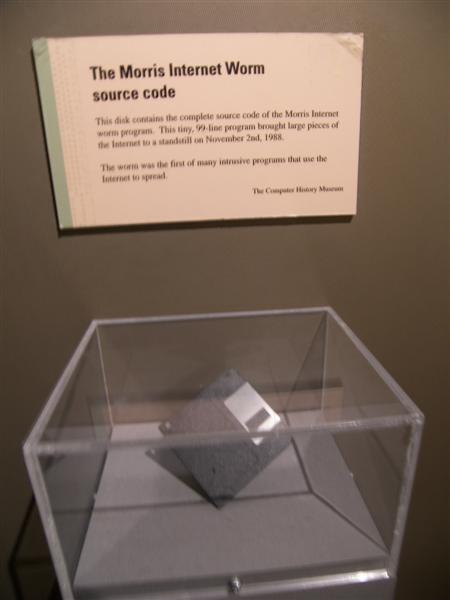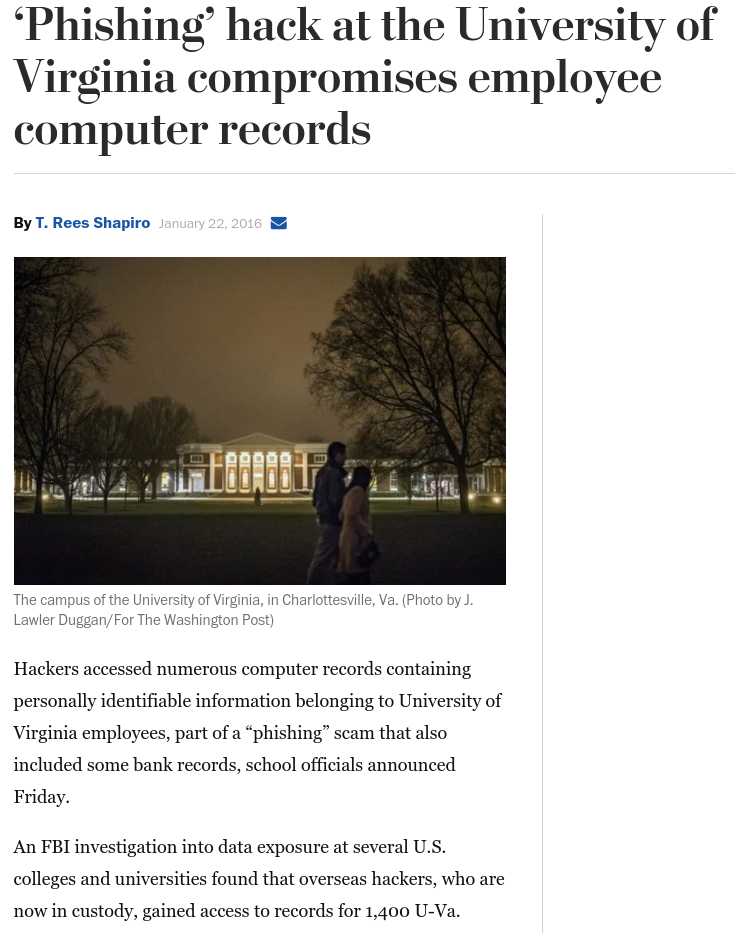CS 3710
Introduction to Cybersecurity
Aaron Bloomfield (aaron@virginia.edu)
@github | ↑ |
Course Introduction
Motivation
First, a definition…
mal: bad, in the Latin
malware: software that is intended to damage or disable computers and computer systems
Costs of Malware
- Cost of malware (worldwide):
- Companies often cover up the worst cases
- Does not include cost of security measures
Malware Costs: Example 1

- April 1999: CIH (Chernobyl) virus
- Overwrites first megabyte of the hard drive with zeros, then overwrites the BIOS
- Only affects Windows 95, 98, and ME
- $250 million lost in one day in Korea alone; widespread across Asia
- Estimated $1 billion in damages in total
- Hard to quantify cost of lost files, time spent reinstalling OS and applications, etc.
Malware Costs: Example 2

- February 2001 mass mailer: Anna Kournikova virus
- Visual Basic script via email, based on LoveLetter
- Enticed people to open it promising a picture of a popular and pretty tennis star
- Social engineering!
- Did little damage, though
- The creator didn’t know how to program!
- He used a virus kit
Malware Costs: Example 3

- 2010 / 2011: Stuxnet worm
- By far the most advanced piece of malware ever created at that point
- It’s goal (and it succeeded!) was to cripple Iran’s nuclear enrichment
- Said program was set back by 1-2 years
- Authors have not come forward, but speculation is a joint Israel / US team
Malware Costs: Example 4

- Ashley Madison data breach in 2015
- This is the site that peddled extra-marital affairs
- The hackers threatened to release the site’s DB info unless the site was closed down
- No ransom was requested!
- They did reveal the information, which led to embarrassment and some suicides
- Interestingly, almost all of the “female” members were bots…
Malware Costs: Example 5

- 2016 US election hacks
- “The US intelligence community has concluded with high confidence that the Russian government interfered in the … election”
- Whether it affected the outcome is up for debate
- And not one I want to engage in now…
- But the fact that they were able to interfere is worrisome
- Interfering in elections is a common tactic; the US has done so a lot as well (source)
Malware Costs: Example 6

- NotPetya in 2017
- Infected Ukrainian companies through a back door put into a Ukrainian version of a TurboTax-like software
- Companies with Ukrainian subsidiaries were infected through their corporate network
- This was “the equivalent of using a nuclear bomb to achieve a small tactical victory”
- There is a good Wired article on it
- Infected Ukrainian companies through a back door put into a Ukrainian version of a TurboTax-like software
Malware Costs: Example 7

- The Colonial Pipeline shutdown
- Ransomware infected the computers of the company that supplies half of the east coast’s oil and gas
- They paid 75 bitcoin (about $5 million) to the ransomware writers (DarkSide)
- The costs beyond that – to regular citizens – have not yet been estimated
Malware Costs: Conclusion
- Computer viruses and other security attacks are very costly
- Computer security is a hot field today; many career and research opportunities for graduates from this course
- Knowledge of security issues is sensitive and carries an ethical responsibility with it
- …but how can you write a detection software for a virus that does not exist yet?
There are also policy motivations
A UVa hack (2013)
Another UVa hack (2015)
Yet another UVa hack (2016)
Cybersecurity and gov’t shutdowns
- The government shutdown from early 2019 lasted 35 days
- With skeletal staffs, many gov’t agencies could not perform basic cybersecurity procedures
- Thus, cybersecurity is one of many things hurt by the shutdown
- source
Course Information
Course Objectives
- Understand the ethical and policy context for cybersecurity in today’s society
- Understand how to better safeguard one’s personal computer
- Understand the basics of advanced topics in cybersecurity including encryption, digital forensics, binary exploits, and networks
- Understand the modern concepts in cybersecurity attacks and prevention
Course Purpose
- This course is meant to be a general introduction to cybersecurity
- It is the pre-req for all the other cybersecurity courses at UVa
Course Sources
- I am not, in fact, the first to create an Introduction to Cybersecurity course
- Some of this course’s content is based on UMich EECS 388
- Intel funded them to create a course under a CC BY-SA license
- Other parts come from online sources
- The ethics part from here, for example
- Some of this course’s content is based on UMich EECS 388
Class Information
- Prerequisites: CS 2100 (DSA1) and CS 2130 (CSO1), each with a grade of C- or higher
- If you are on the old curriculum, then CS 2150 (PDR) with a grade of C- or higher
- Grades
- I reserve the right to adjust the percentages based on the number of assignments and quizzes, and other factors
More on that pre-requisite
- If you are are a transfer student (or a non-UVA student during the summer term), then your pre-req is all of the following:
- two semesters of programming experience
- knowledge of programming in C or C++
- knowledge of programming in assembly
Exams
- As mentioned, two midterms
- Thu, Oct 2 and Thu, Nov 6, both in class
- Final exam
- Monday, December 15th from 9am to noon
- You can’t take it early, so please don’t ask
- You can’t take it late, either
Homeworks
- Late homework is docked 25% per day (or fraction thereof)
- Thus, more than 72 hours late will receive a zero
- Homeworks will generally be given out, one per week
- Some “easy” ones will be more often
- Some “hard” ones will have a bit more time
- Note that the difficulty level of the homeworks varies considerably
Extensions
- You can get 6 extensions for homeworks throughout the semester
- Each one adds 4 days to the due date; late penalties would kick in after
- There is no bonus for not having used them all
- This is done through an online extensions system; link on Canvas landing page
- This covers ALL accommodations: travel, holidays, being busy, family emergencies, SDAC (generally), dog ate your homework, religious observances, interviews, thunderstorms, power outages, temporal dislocation, etc.
Us and you
- Office hours will be posted on the Canvas landing page
- And by appointment
- I avoid e-mailing the class; announcements will be discussed each day in lecture and posted to Canvas / Piazza
- To contact me, chat with me before, during, or after class
- We also have Piazza as well for questions
Course Materials
- We are coordinating out of a Canvas workspace
- It should be all configured, with the assignments and exams already in the calendar
- Those dates are subject to change, though
- They are kept in a github repo: https://github.com/aaronbloomfield/ics
- Released under a Creative Commons Attribution-ShareAlike 4.0 International License (CC BY-SA) license
- That repo is viewable online at http://aaronbloomfield.github.io/ics/
Tentative schedule
- Introduction (1 week): course introduction and motivation, terminology, security mindset
- Ethics & Policy (2 weeks): ethics, policy
- Encryption (2 weeks): encryption, hashes
- Networks (2 weeks): networks, web security
- Binary manipulation (2 weeks): viruses, buffer overflows, binary exploits
- Modern topics (3 weeks): SQL/XSS/CSRF, anonymity, cryptocurrency, Stuxnet, rootkits, VMs
- Digital forensics (1 week): forensics
- Note that for the summer, one semester week is about 1.25 summer lecture days
Homeworks
- Each module will generally have two assignments during a regular (fall/spring) semester (and less than that during a summer term)
- Either a written homework, submitted as a PDF
- Will consist of writing, math, and short programs
- Or a programming assignment; source code will be submitted
- Either a written homework, submitted as a PDF
- Please read the homework policies page, as you are going to be bound by it!
Completing the homeworks
- Most you will run it on your own computer
- We will provide a separate online environment for some assignments
- Some homeworks will require a specific platform or language, others it will be a recommendation, and others can be done on any platform
- You can use any development environment (including IDE) that you would like
Readings
- There is no assigned textbook
- They get outdated too quickly!
- However, there will be readings assigned
- These readings may have pop quizzes to test that you actually read it
- If you miss class, then you get a zero for the quiz!
- They will be via provided PDFs and/or online materials
- Some of the “readings” may be podcasts to listen to
What you must purchase
- Nothing
- (there is no textbook for this course, only online materials)
- But, as it’s a computer science course, you need to have a (working and recent) computer
- If you don’t, or if yours breaks, let me know, and the department can loan you one
Politics
- Some of the discussion in this class will be regarding politics
- Especially the policy discussion late next week
- Although I have strong political opinions, I have always maintained strict political neutrality when teaching my classes
- If you ever feel this is not the case, please let me know!
- That being said, if something is stupid, I’m going to say so (generally something technology related)
- I don’t consider that politics – just common sense
Sensitive topics
- Cybersecurity is closely tied to spam (a common vector), which is closely tied to pornography (a common means to get clicks)
- We will be discussing these as well – and yes, in a professional manner
Honor policy
- All assignments are individual assignments
- You can talk at a high level about the assignment
- You cannot look at anybody else’s code prior to either of your submissions
- Once you both have submitted it for the FINAL time, you may discuss code
- Any honor violation or cheating will be referred to the honor committee, and will result in immediate failure for the course
Generative AI
- You may use generative AI, such as ChatGPT, to help you study and understand concepts
- All the code you submit must be your own, and cannot come from a generative AI
- It turns out that generative AI is not all that useful for most of our assignments
- At least one assignment will require you to use generative AI (ethics)
- For all others: you have to write the essay or code all by yourself
Ethics
Computer Ethics
- We must teach how attacks upon computer systems work in order to teach defenses against attacks
- Information about attacks must NEVER be used to attack any computer system in any way
Ethics Pledge
- You will have to read and sign the ethics pledge
- It should not be difficult to follow
- Ethics will be covered in more detail later
- You cannot continue in the course without signing the ethics pledge
- I’ll provide the pledge links to sign electronically in a day or two
Ethics Pledge Points
- Unauthorized use of computer resources is forbidden
- Even malware that does nothing but copy itself uses resources
- Don’t ever rationalize that a system owner won’t object to your actions; ask permission
- If you are afraid to ask permission, it must be forbidden!
Example: 1988 Morris Worm

- Creator rationalized that the worm did no damage
- It only copied itself from system to system over the Internet
- BUT: Copying monopolized system resources until they had to be shut down
- Worm reached 10% of entire Internet
- Creator did not realize it would be that resource-intensive
- Creator was convicted of felonies!
- And is now a professor at MIT. Go figure!
Morris Worm Lessons
- Consequences of a virus or worm cannot always be foreseen
- Severe damage can be done without destroying data
- Excessive resource usage is destructive enough to be criminal
Criminal Prosecution
- Attackers have been prosecuted for:
- Stealing passwords, even if never used
- Copying copyrighted materials
- Accessing confidential data, even if it was never used for harmful purposes
- Entering a system without permission, causing sys admins to spend time tracking them and securing the system, even without otherwise causing harm
- Moral: Don’t assume it is legally safe to do any of the above
Ethics Violations
- Violations by students endanger our ability to offer this course
- As a result, they will be treated severely
- UJC (University Judiciary Committee)
- Course grades
- Criminal prosecution
ACM Code of Ethics

- ACM is the primary professional organization for computer scientists
- IEEE is the other
- The entire code is available at http://www.acm.org/about/code-of-ethics
Ethics Questions
- Scenario: John Doe attempts to guess the password of a user of a system on which John Doe has no account. After a few guesses, he succeeds, but finds nothing of interest on the system and logs off.
- Q1: Has he committed a crime?
- Q2: Are his actions analogous to any common crime not involving computers?



